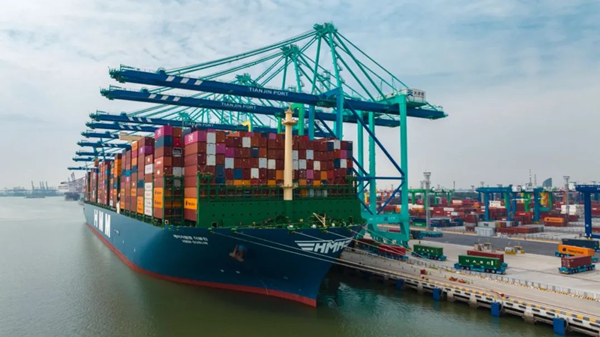Tianjin Port shows strong growth momentum in H1

Thanks to the implementation of the”dual circulation” development paradigm, in which domestic and overseas markets reinforce each other, with the domestic market as the mainstay, the volume of freight passing through North China’s Tianjin Port grew by 2.1 percent on an annual basis to 241 million tons in the first half of this year.
Meanwhile, the volume of containers shipped there reached 11.35 million, a year-on-year increase of 8 percent.
This year, Tianjin Port has accomplished the upgrading of 300,000-ton wharf project and the expansion of a railway project in Nanjiang Sub-port in the midst of building itself into an international shipping hub in northern China.
Tianjin Port has inked strategic cooperation agreements with Hebei, Wuqing and Nankai districts on the integrated development between them, provided local major enterprises and industrial zones with precise logistics solutions, deepened its collaboration with Dongjiang Free Trade Port Zone on the building of a shipping-oriented industrial cluster and the expansion of its business scope, and signed a cooperation deal with Tianjin Binhai International Airport on the seamless integration between shipping and air transportation.
Tianjin Port has launched the world’s first wharf powered by the Internet of Things, unveiled the world’s first hydrogen & electricity-driven Artificial Intelligence Robot of Transportation (ART), put into operation a set of carbon-free ro-ro shipping routes, opened four new direct shipping lines for Hyundai Merchant Marine (HMM) a special container liner for the shipment of Volvo-made cars to Europe.
It has also conducted investment promotion activities in European and Southeast Asian countries, and further strengthened its business cooperation with leading international shipping corporations and customers.
In the years ahead, Tianjin Port will take actions to further enlarge its services and functions, improve business environment, bolster its integrated development with inland areas, facilitate the transformation of its development approaches, and better promote the coordinated development of the Beijing-Tianjin-Hebei region as well as the implementation of the Belt and Road Initiative.
 京公網安備 11010802027341號
京公網安備 11010802027341號